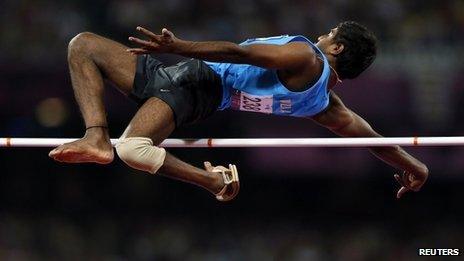Will Paralympics change attitudes to India's disabled?
- Published

Girisha Nagarajegowda had quit his job to concentrate on the training
Record-breaking performances and packed venues made the London Paralympics the most successful ever and many say it has changed the way people look at disability.
But the message may take some time to reach India.
The country had a lone shining moment with Girisha Hosanagara Nagarajegowda's silver medal in Men's High Jump F42 class for athletes with an impairment that affects their arms or legs.
And deservedly the nation cherished Girisha's feat as medals have generally eluded India's Paralympians. But now questions are being raised at the country's ability to translate the congratulatory tone into awareness of disabled rights.
India is not known for being friendly towards the disabled and most public places still lack basic facilities to help them in everyday life.
'Second-class' citizens
Even before Girisha won his medal, Indian media was abuzz with stories about problems at the Athletes' Village.
Several athletes complained that the Paralympics Committee of India had failed to book accommodation for escorts and coaches at the facility. This made the lives of the athletes very tough as they were denied precious time with their coaches.
Taking to CNN-IBN, weightlifter Farman Basha said his preparation was severely affected because he could not move freely in the village without his escort. "I was confident of a medal and now all my training has gone in vain," he said.
The channel's editor, Rajdeep Sardesai, ran a special show to discuss whether India treats its Paralympians as second-class citizens. Many other channels and newspapers followed suit.
It's an irony that the controversy received more coverage than the Games themselves.
India may have won just one medal, but the Games were full of inspiring stories. The media seems to have clearly missed a chance to tell these stories to Indians in detail.
Attitude woes
Speaking on the CNN-IBN show, Olympic silver medallist Rajyawardhan Singh Rathod said he was not surprised with the treatment of India's Paralympians.
He said much needs to be changed to give equal rights to Paralympians and millions of disabled people in India.
"It's an over-all attitude shift that we need to bring about in our country," he said.
There is another thread to the story that the India media seems to have missed. The Indian contingent at the Paralympics did not have a single female athlete.
While officials say this boils down to qualification woes, the problem runs much deeper.
Most schools and colleges lack basic sporting facilities for the disabled and the ones which do rarely encourage disabled women to participate.
A hero
While stories about the controversy continue to make headlines, nobody can take anything away from Girisha. The athlete certainly fought against the odds to make sure India did not return home from London empty handed.
He hails from the south Indian state of Karnataka and belongs to an average middle class family. But his determination to win a medal set him apart from others.
His training in Bangalore took place away from the glare of the media and fan recognition. With support from an NGO and government, Girisha quit his bank job six months ago to concentrate on training.
Today the result is there for everyone to see. And he hopes that his achievement will transcend the boundaries of sporting achievement and change the attitude of people towards disabled in India.
BBC Monitoring, external reports and analyses news from TV, radio, web and print media around the world. For more reports from BBC Monitoring, click here